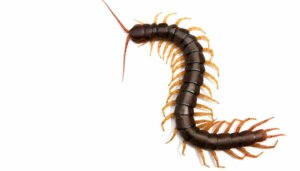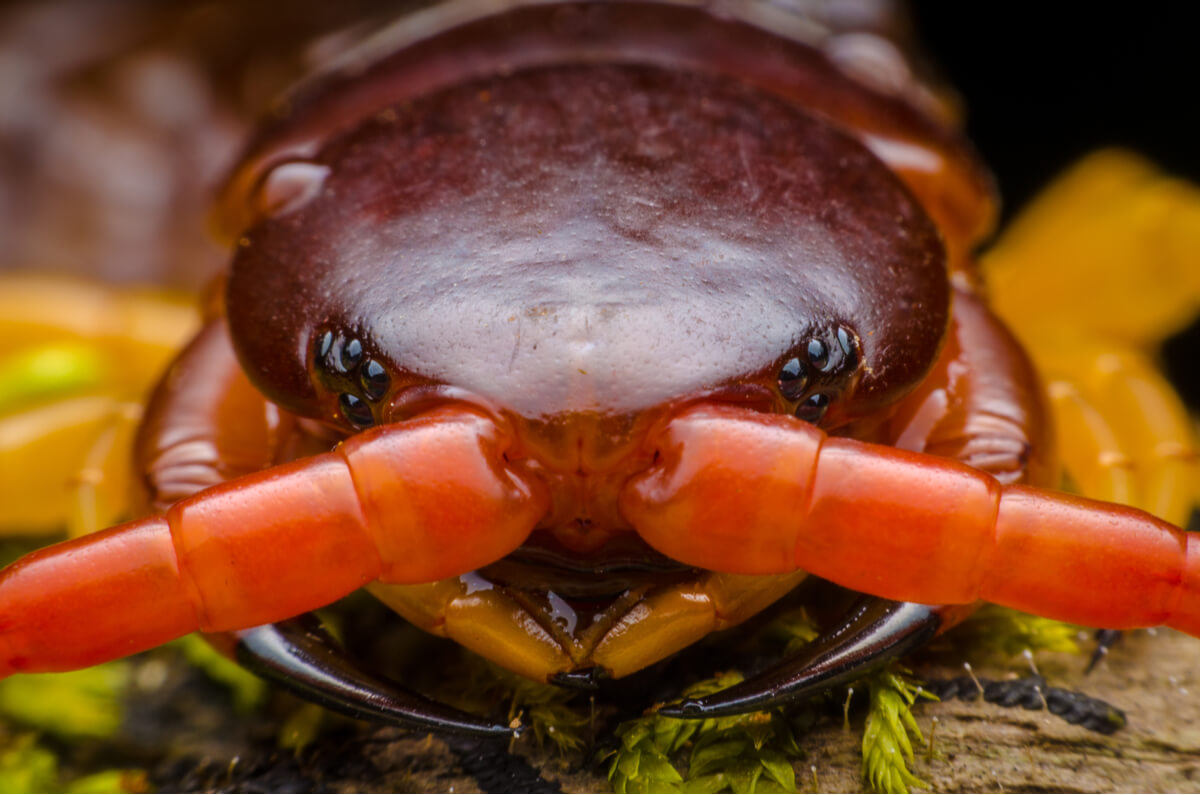Centipede Bites in Dogs: What Should You Do?


Reviewed and approved by the biologist Samuel Sanchez
It is nothing out of the ordinary to find a centipede crawling around our homes, in gardens or orchards. It’s not surprising that centipede bites in dogs are more common than many imagine. In addition to this, what few owners know is that this bite can cause problems for animals, to a greater or lesser extent.
While it’s true that the toxicity of a centipede bite isn’t lethal in many cases, the injury caused can evolve into something more serious. Whether the consequences are more dangerous or not will depend on various factors that we’ll explain in this article.
Symptoms of centipede bites in dogs
Typically, centipedes bite when threatened. In the case of dogs, this is quite common, since many like to chase them and even eat them, something that can be quite serious.
When a centipede bites a dog, the symptoms can be variable depending on different factors. Among these symptoms, the main one will be the inflammation around the bite or the entire area. It’s common for these arthropods to bite the dog on the snout, ears, legs and abdomen.
Due to the toxin that’s inoculated, and depending on the amount, the dog may show apathy, weakness, lack of appetite, fever, and difficulty breathing. If the dog eats the centipede, its bite can cause gangrene in the tissues of the mouth; it can also have the same effect on the pads of its feet.
Check the animal’s feces to see if they’re different than usual, as this can give clues as to whether the animal has ingested a scolopendra.

Are centipede bites dangerous for dogs?
As a general rule, centipede bites in dogs aren’t usually too dangerous. As experts indicate, the most usual thing is a painful inflammation that will diminish little by little, without lasting much more than 48 hours.
However, there are several factors that can worsen the symptoms, and these pose a real danger to the animal. Mainly there are three conditions that must be taken into account:
- The number of bites: If the centipede bites the dog several times, the poison introduced with its bites will be greater.
- The centipede species: The most common centipede bite, Scutigera coleoptrata, doesn’t usually severely affect dogs. However, other species can harm them. This is the case of Scolopendra viridicornis or Otostigmus scabricauda.
- The sensitivity of the animal: Some factors can cause one dog to be affected more than another, such as its age, if it suffers from an allergy, if it suffers from heart disease, or if it has respiratory conditions.
You must be especially careful with the species in the genus Scolopendra. Some of the arthropods included here can be more than 30 centimeters (2 inches) in length and have enormous calipers. Certain scolopendras have the dubious merit of causing the most painful bites in the world, although they’re not usually lethal.
How to deal with centipede bites in dogs?
When a centipede bite has been detected in a dog, the main thing is to wash the wound with water and neutral soap. You can then pat it dry with sterile gauze and a little cold applied to the area to reduce swelling and discomfort. To do this, you can use a couple of ice cubes, but never directly on the skin – always wrapped in a bag and covered by a fine cloth.
In the event that you see more serious symptoms – such as that the area becomes more inflamed than normal, or that the dog vomiting or having respiratory problems – then you should go to the vet immediately. If you have seen the centipede culprit, it would be good to have a photo of it, as they will have more information on how to proceed.
The veterinarian will clean the wound thoroughly, and will administer the necessary medications. With the most lethal species, every second is vital, in order to increase the dog’s chances of survival.
How to avoid centipede bites in dogs
If you want to avoid contact with centipedes, the main thing is to know where this type of arthropod usually lives. Centipedes often look for low-light areas to hide, but they also like places with humidity.
For this reason, in homes, you usually find them in patios, especially if there are fenced green areas – orchards, gardens, vases with plants – and, indoors, in bathrooms. It’s also very common for them to lie in piles of dead wood or stones.
Taking these aspects into account, to avoid encounters with centipedes, as well as their bites and those of other insects that harm pets and people, we recommend you have good ventilation in the home so that moisture doesn’t accumulate inside. Check the corners of your house if you live in a low-level house located in an intertropical area.
In addition to this, centipedes are usually attracted to the small animals they feed on, and so if the house and its surroundings are free of them, there will be fewer of them. Avoid the accumulation of flies and other insects inside your house, as this can attract predators.

On the other hand, keep in mind that there can also be scolopendras in parks and forests. Keep an eye on your dog when it’s walking through these areas. The processionary caterpillar can be especially dangerous. The best treatment is always prevention.
It is nothing out of the ordinary to find a centipede crawling around our homes, in gardens or orchards. It’s not surprising that centipede bites in dogs are more common than many imagine. In addition to this, what few owners know is that this bite can cause problems for animals, to a greater or lesser extent.
While it’s true that the toxicity of a centipede bite isn’t lethal in many cases, the injury caused can evolve into something more serious. Whether the consequences are more dangerous or not will depend on various factors that we’ll explain in this article.
Symptoms of centipede bites in dogs
Typically, centipedes bite when threatened. In the case of dogs, this is quite common, since many like to chase them and even eat them, something that can be quite serious.
When a centipede bites a dog, the symptoms can be variable depending on different factors. Among these symptoms, the main one will be the inflammation around the bite or the entire area. It’s common for these arthropods to bite the dog on the snout, ears, legs and abdomen.
Due to the toxin that’s inoculated, and depending on the amount, the dog may show apathy, weakness, lack of appetite, fever, and difficulty breathing. If the dog eats the centipede, its bite can cause gangrene in the tissues of the mouth; it can also have the same effect on the pads of its feet.
Check the animal’s feces to see if they’re different than usual, as this can give clues as to whether the animal has ingested a scolopendra.

Are centipede bites dangerous for dogs?
As a general rule, centipede bites in dogs aren’t usually too dangerous. As experts indicate, the most usual thing is a painful inflammation that will diminish little by little, without lasting much more than 48 hours.
However, there are several factors that can worsen the symptoms, and these pose a real danger to the animal. Mainly there are three conditions that must be taken into account:
- The number of bites: If the centipede bites the dog several times, the poison introduced with its bites will be greater.
- The centipede species: The most common centipede bite, Scutigera coleoptrata, doesn’t usually severely affect dogs. However, other species can harm them. This is the case of Scolopendra viridicornis or Otostigmus scabricauda.
- The sensitivity of the animal: Some factors can cause one dog to be affected more than another, such as its age, if it suffers from an allergy, if it suffers from heart disease, or if it has respiratory conditions.
You must be especially careful with the species in the genus Scolopendra. Some of the arthropods included here can be more than 30 centimeters (2 inches) in length and have enormous calipers. Certain scolopendras have the dubious merit of causing the most painful bites in the world, although they’re not usually lethal.
How to deal with centipede bites in dogs?
When a centipede bite has been detected in a dog, the main thing is to wash the wound with water and neutral soap. You can then pat it dry with sterile gauze and a little cold applied to the area to reduce swelling and discomfort. To do this, you can use a couple of ice cubes, but never directly on the skin – always wrapped in a bag and covered by a fine cloth.
In the event that you see more serious symptoms – such as that the area becomes more inflamed than normal, or that the dog vomiting or having respiratory problems – then you should go to the vet immediately. If you have seen the centipede culprit, it would be good to have a photo of it, as they will have more information on how to proceed.
The veterinarian will clean the wound thoroughly, and will administer the necessary medications. With the most lethal species, every second is vital, in order to increase the dog’s chances of survival.
How to avoid centipede bites in dogs
If you want to avoid contact with centipedes, the main thing is to know where this type of arthropod usually lives. Centipedes often look for low-light areas to hide, but they also like places with humidity.
For this reason, in homes, you usually find them in patios, especially if there are fenced green areas – orchards, gardens, vases with plants – and, indoors, in bathrooms. It’s also very common for them to lie in piles of dead wood or stones.
Taking these aspects into account, to avoid encounters with centipedes, as well as their bites and those of other insects that harm pets and people, we recommend you have good ventilation in the home so that moisture doesn’t accumulate inside. Check the corners of your house if you live in a low-level house located in an intertropical area.
In addition to this, centipedes are usually attracted to the small animals they feed on, and so if the house and its surroundings are free of them, there will be fewer of them. Avoid the accumulation of flies and other insects inside your house, as this can attract predators.

On the other hand, keep in mind that there can also be scolopendras in parks and forests. Keep an eye on your dog when it’s walking through these areas. The processionary caterpillar can be especially dangerous. The best treatment is always prevention.
All cited sources were thoroughly reviewed by our team to ensure their quality, reliability, currency, and validity. The bibliography of this article was considered reliable and of academic or scientific accuracy.
- Mordeduras de ciempiés y milpiés. Recogiendo el 5 de julio en https://www.msdmanuals.com/professional/injuries-poisoning/bites-and-stings/centipede-and-millipede-bites
- Scolopendromorpha. Recogido el 5 de julio en https://es.wikipedia.org/wiki/Scolopendromorpha
- Ph.D., R. B. C., Moore, W., & Shuster, S. M. (2016). Invertebrates (3rd ed.). Sinauer Associates Is an Imprint of Oxford University Press.
- Is Centipede Bite Poisonous To Dogs? Recogido el 5 de julio en https://zooawesome.com/home-pets/is-centipede-bite-poisonous-to-dogs/
- Centipede bite. Recogido el 5 de julio en https://en.wikipedia.org/wiki/Centipede_bite
This text is provided for informational purposes only and does not replace consultation with a professional. If in doubt, consult your specialist.








